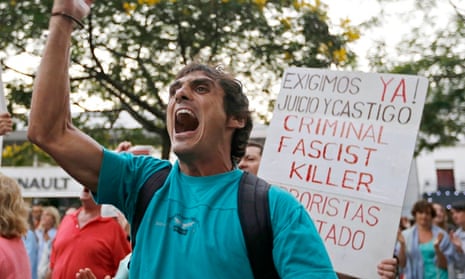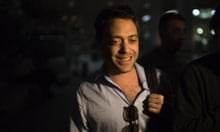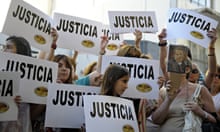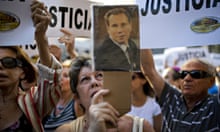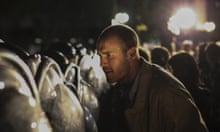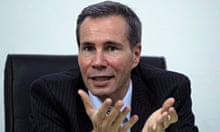The death of prosecutor Alberto Nisman in Buenos Aires this weekend is yet another reminder of how Argentina has over the last two decades been bungling the judicial investigation into one of the deadliest antisemitic attacks anywhere in the world since the Holocaust.
The energetic, garrulous Nisman, 51, was driven by a deep passion to bring to justice a small group of Iranian officials his evidence allegedly showed had been behind the terrorist bombing of the AMIA Jewish community centre in downtown Buenos Aires two decades ago.
That massive blast, ascribed to a suicide bomber driving a stolen white Renault van loaded with explosives, resulted in the death of 85 people, mainly Jewish. Hundreds of others were injured as the blast sent a ghastly plume of smoke billowing over the city of Buenos Aires on the morning of 18 July 1994.
The prosecutor’s death this weekend was described as a new attack against the Jewish community. “With the death of Nisman, the AMIA bomb exploded again,” said Julio Schlosser, the head of the DAIA, Argentina’s largest Jewish community organisation.
In 2007, on the basis of Nisman’s investigation as the case prosecutor, Interpol issued an international arrest warrant for Iranian officials who are suspected of having masterminded the blast. Chief among them was Mohsen Rabbani, the former Iranian cultural attache in Argentina at the time of the blast.
Nisman’s pursuit of the Iranian lead in the case seemed to give purpose to a case that had been bogged down since its start by incompetence and blatant attempts to bury leads by its previous investigators. The original judge was impeached after he was videotaped bribing his only suspect with a $400,000 payment to accuse innocent police officers.
But instead of working to obtain the extradition of the accused, since 2007 the government of president Fernández, driven perhaps by the deep and long-running anti-Americanism of the Peronist party to which she belongs, pursued a radical international course, seeking strategic alliances with like-minded leaders such as the late Hugo Chávez of Venezuela, Russia’s Vladimir Putin and the heads of the Islamic Republic of Iran.
Although Argentina’s government makes no secret of its ideological preferences, it still came as a devastating shock last Wednesday when Nisman presented a 300-page complaint before federal judge Ariel Lijo against the president. Nisman accused her of conspiring with her foreign minister, Héctor Timerman, through secret negotiators to clear Iran of charges in return for Iranian oil to make up for the debilitating energy deficit that had resulted from years of government mismanagement.
Nisman’s wiretaps allegedly show that the “impunity for oil” negotiations were being conducted by phone through a middleman in Buenos Aires with the main suspect in Iran, Rabbani himself.
“There’s been an alliance with the terrorists,” said Nisman in a 37-minute television interview last Wednesday in which he described how negotiators – whom he said were chosen and directed personally by Fernández – called Rabbani’s go-between in Buenos Aires saying they were coming out of the president’s office with precise instructions regarding the negotiations.
Nisman said he was so shocked when he first heard the wiretaps that he refused to believe his own evidence. He became convinced, he explained, when he heard the conspirators talking about details of the president’s health that only became public a few days after the conversations were recorded.
To his anger at seeing the case he had built up against the Iranians allegedly being negotiated away in exchange for oil, was added the insult of hearing himself referred to as a “dirty Jew” on the intercepted calls, as the Argentinian negotiators provided the Iranians with secret details of his investigation.
“Iran admits and even boasts that it carried out the attack,” the prosecutor said of the intercepted calls. “It’s astounding how the attack is admitted.”
Three nights after that interview, Nisman died in the bathroom of his luxury apartment in Puerto Madero, a new section of the city with expensive high-rise apartment buildings built on former lands of the Buenos Aires port area.
When his mother entered the apartment with members of his personal bodyguard who had to call a locksmith to open the door when Nisman failed to respond to phone calls, she found him lying face up on the bathroom floor with a small-calibre bullet wound through his head. The guards had to push his body aside because it was blocking them from opening the door.
Few believe it was suicide, although that is the version the government immediately espoused. “How can we know what went through the prosecutor’s head at that moment?”, asked the presidential secretary, Aníbal Fernández, on Monday morning speaking to the press.
Those with longer memories recall a tradition of political “suicides” in Argentina going back decades, including the mysterious death of Juan Duarte, the brother of the legendary Evita Perón, who was “suicided” in 1953, less than a year after his sister had died of cancer, a death that some versions say was related to the post-war transfer of Nazi funds to Argentina.
Nisman’s death has reverberated through the country. News coverage has been round the clock and the two top trending topics on Twitter in Argentina are #MuerteDeNisman (Death of Nisman) and #CFKAsesina (CFK Murderer).
Journalists who had spoken with Nisman in the past few days found him anything but suicidal. The prosecutor was due to speak to a special committee of congress on Monday to reveal more details of his intercepts.
To one journalist, Nisman said he had revealed only 5% so far of what he had discovered.
